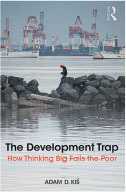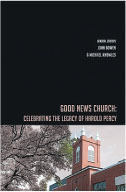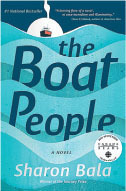Your Future Self Will Thank You: Secrets to Self-Control from the Bible and Brain Science (Drew Dyck). The Development Trap (Adam D. Kiš). Good News Church: Celebrating the Legacy of Harold Percy (Editors John Bowen and Michael Knowles). Surprised by Paradox (Jen Pollock Michel). The Boat People (Sharon Bala). Art by Gene Tempelmeyer.

Your Future Self Will Thank You: Secrets to Self-Control from the Bible and Brain Science
By Drew Dyck
Moody Publishers, 2018. 224 pages. $19.99 (e-book $15.99, audio CD $34.99, audiobook $19.99). Browse at Books.Google.ca
WE HAVE all tried to make changes and found ourselves feeling like failures. In this "guide for sinners, quitters & procrastinators," Drew Dyck, a Canadian who works for CTPastors.com and Moody Publishers, provides biblical and practical insight into self-control and how to practise it.
First, he shows how our struggle with willpower goes back to the origin of human brokenness. "We are not inherently good creatures who simply need more freedom and affirmation. Rather, we are splendid, but damaged. Like crooked timbers we need to be straightened." Self-control is inherently spiritual.
Self-control is inherently spiritual.
Dyck also draws on studies in brain science, highlighting how it confirms the Bible. One of the more potent: "Willpower is a finite resource, one that can be depleted." That’s a crucial point, considering how often we try to change our diet, our prayer habits and more all at the same time.
However, as he helpfully explains, "We can grow our willpower and we need to conserve it. We also need to replenish it."
Reflecting on his own experiences, Dyck recognizes lasting changes are not a matter of simply trying harder. They require understanding the problem to its roots – seeing ourselves more honestly and therefore more biblically.
Unlike many other authors who tackle self-help, Dyck offers a biblical picture of the disciplined life that shows the importance of self-control and how to practise it more effectively. –DEREK MELANSON

The Development Trap: How Thinking Big Fails the Poor
By Adam D. Kiš
Routledge, 2018. 190 pages. $29.99 (e-book $25.99). Browse at Books.Google.ca
RESEARCH AND REFLECTION, bolstered by nearly ten years of hands-on work in sub-Saharan Africa and Southeast Asia, has convinced Adam Kiš that universal poverty eradication is a mirage. It’s time to reassess how we do international aid.
Given the rapid growth of international nongovernmental aid agencies (832 in 1950 to 27,472 in 2006), and in light of the massive dollars involved ($7 billion in 1959to $507.8 billion in 2010), this book is sure to spur vigorous discussion.
Kiš explores historical, philosophical, economical and cultural barriers to poverty eradication. These barriers are discouraging. "If coming up with just the right technology, scientific breakthrough or economic theory was all that was necessary to achieve it, the world would certainly be free from poverty by now." Billions of dollars over decades have had "little appreciable impact upon development" because the approach has been too big.
Kiš convincingly rebuts the one size-fits-all, macroeconomic approach. It is time to refocus on culturally sensitive, realistic goals. "Solutions that will rock the world of one child, five mothers or a dozen farmers" are worthwhile. More emphasis on sustainable opportunities to rise out of poverty, less on temporary relief.
This book effectively distills a mind-numbing pile of facts and figures, interspersed with real-life stories. It primarily targets professionals, but anyone who donates to international aid will find this a useful resource. –DAVID S. DANIELS

Good News Church: Celebrating the Legacy of Harold Percy
Editors John Bowen and Michael Knowles
Castle Quay Books, 2018. 280 pages. $19.95 (e-book $9.99). Browse at Books.Google.ca
FROM 1987 to 2010 Harold Percy was the rector at Trinity Anglican Church in Mississauga, Ont. During that time, it transformed from a small Streetsville neighbourhood church to a vibrant and lively one.
This book celebrates Percy’s legacy in revitalizing this church, and his influence beyond Anglican circles. It is a collection of essays that celebrates Percy’s pastoral gifts in four areas – leadership, discipleship and spirituality, congregational ministry and reaching out.
In 1991 Percy founded the Institute of Evangelism within Wycliffe College at the University of Toronto. John Bowen and Michael Knowles are two veteran leaders who worked with Percy. For this book they approached a variety of people to share insights from their interactions with Percy.
Most books on revitalization end up being how-tos that leave you wondering if the principles can be replicated in your own setting. This book will leave you eager and optimistic to practise Percy’s legacy in your church.
It’s also easy for essay collections to end up as uneven jumbles. But this one is good from start to finish, and remarkably unified. Perhaps the success derives from the contributors being practitioners before they are writers.
This fine tribute to the life and times of Harold Percy leaves readers celebrating what God has accomplished through him. –PYE CHEW

Surprised by Paradox: The Promise of "And" in an "Either-Or" World
By Jen Pollock Michel
IVP Books, 2019. 192 pages. $19.99 (e-book $18.99, audiobook $19.99). Browse at Books.Google.ca
ON THE top of a mountain admiring the view, we can suddenly feel very small. It’s a contradiction as hard to understand as an almighty, sovereign God who loves even me.
Surprised by Paradox is an intriguing and challenging look at such mysteries in the Bible. Torontobased author Jen Pollock Michel highlights how these contradictions illustrate who God is and who we are. She prompts her readers to put away blind faith and examine how these incongruities impact their relationship with their Saviour.
Four paradoxical events in the life of Christ are showcased – incarnation, kingdom, grace and lament. Each area shows how paradox can lead to wonder, as with the story of the burning bush that did not burn up, leading Moses to the presence of God and to worship.
Readers are led to similar discordances and are shown what it means to wonder. We are given a chance to be like Moses and say, "I will go over and see this strange sight" (Exodus 3:3). We are reminded that "Just because something cannot be explained, does not mean it is false."
Christ has a plan and purpose in His paradoxes. This book reminds us to marvel at the awesomeness of God. Even though we may not understand the secrets of God, we can still trust Him. –ADENA LOWRY

READING THE BESTSELLERS
The Boat People: A Novel
By Sharon Bala
McClelland & Stewart, 2018. 416 pages. $19.99 (e-book $11.99). Browse at Books.Google.ca
THIS DEBUT NOVEL offers an illuminating story of the people who abandon their once-beloved homeland to escape bloody civil war. The main character Mahindan, a Sri Lankan widower, imagines the freedom he will experience in Canada once he and his young son exit the 60-metre freighter with the other 500 passengers. He endures the risky journey, reminding himself Canada will provide something precious – safety and the ability to breathe.
He learns quickly that "When it comes to refugees, this country has a split personality." When the refugees are rescued off the B.C. coast, the adults are shackled at wrists and ankles, and placed in detention camps for months to endure hearing upon hearing, wondering if after all they have endured they will be able to stay.
The Boat People is told from several points of view – Mahindan, his six-year-old son, a Canadian law student named Priya whose parents are Tamil, and Grace, the adjudicator, a Japanese Canadian whose opinions have been influenced by a politician who wants the refugees to go back where they came from.
The Boat People is a heart-wrenching story that challenges readers to consciously consider the plight of refugees arriving in Canada. They are not an anonymous group of potential terrorists. They are fleeing persecution and longing to live free of bombings and horrific acts of injustice, to raise their children in a safe environment. Whatever else comes is a gift.
The novel shows that even if Canadians all came to this country in different ways, we must recognize the commonalities that exist as we reside together. –LUCY KRAEMER
CANADIAN CREATIVES
Gene Tempelmeyer
PAINTING © GENE TEMPELMEYER
Crystal Blue Persuasion (oil on canvas, 40″ × 30″) by Gene Tempelmeyer, www.GKTArt.com.
"God made us by taking mud from earth and breathing His life into it. We are created in both the image of God and the image of earth. We are intrinsically connected to both. I cover a piece of canvas fabric with a thin coat of coloured oil to try to demonstrate how the glory of God is always embedded in material things He created. I want to show the constant interaction between earth’s physicality and heaven’s energy."